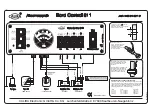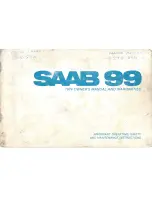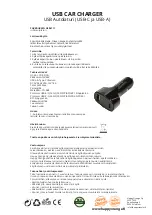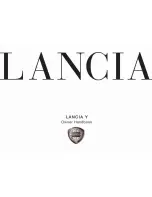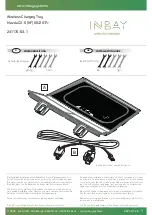
CORROSION PREVENTION AND APPEARANCE CARE
CORROSION PREVENTION AND APPEARANCE CARE
CORROSION PREVENTION AND APPEARANCE CARE
CORROSION PREVENTION AND APPEARANCE CARE
CORROSION PREVENTION AND APPEARANCE CARE
4-3
(at least once a month). Give special attention
to the removal of salt, mud and other substanc-
es on the underside of the splashboards of the
car. Make sure that the outlets and the under-
side of the doors are open. Paint damage can
be caused by small accumulation of tar, indus-
trial precipitation, tree resin, insects and bird
droppings, when not removed immediately.
If water alone is not strong enough to remove
the accumulated dirt, use a mild car washing
solution. Be sure to rinse the surface after
washing to remove the solution. Never allow
the solution to dry on the painted surfaces.
E030C01A-AAT
Polishing and Waxing
Polishing and Waxing
Polishing and Waxing
Polishing and Waxing
Polishing and Waxing
Always wash and dry the car before polishing
or waxing or using a combination cleaner and
wax. Use a good quality commercial product
and follow the manufacturer's directions on the
container. Polish and wax the bright trim pieces
as well as the paint.
E030B01A-AAT
Spot Cleaning
Spot Cleaning
Spot Cleaning
Spot Cleaning
Spot Cleaning
Don't use gasoline, strong solvents or corrosive
cleaning agents. These can damage the finish
of the car. To remove road tar, use turpentine
on a clean, soft cloth or commercially available
bug and tar remover. Be gentle.
To remove dead insects or tree sap, use warm
water and mild soap or car-washing solution.
Soak the spot and rub gently. If the paint has
lost its luster, use a commercial car-cleaning
polish.
E030D01A-AAT
When to Wax Again
When to Wax Again
When to Wax Again
When to Wax Again
When to Wax Again
You should polish and wax the car again when
water no longer beads on a clean surface but
spreads out over a larger area.
E030E01A-AAT
Maintaining Bumpers
Maintaining Bumpers
Maintaining Bumpers
Maintaining Bumpers
Maintaining Bumpers
Special precautions must be observed to pre-
serve the appearance of the bumpers on your
Hyundai. They are:
o Be careful not to spill battery electrolyte or
hydraulic brake fluid on the bumpers. If you
do, wash it off immediately with clean water.
o Be gentle when cleaning the bumper sur-
faces. They are made of soft plastic and the
surface can be damaged if mistreated. Do
not use abrasive cleaners. Use warm water
and mild soap or car-washing solution.
o Do not expose the bumpers to high tem-
peratures. For example, if you have your
car repainted, do not leave the bumpers on
the car if the car is going to be placed in a
high temperature paint booth.
E040A01A-AAT
CLEANING THE INTERIOR
CLEANING THE INTERIOR
CLEANING THE INTERIOR
CLEANING THE INTERIOR
CLEANING THE INTERIOR
To Clean the Vinyl Upholstery
To Clean the Vinyl Upholstery
To Clean the Vinyl Upholstery
To Clean the Vinyl Upholstery
To Clean the Vinyl Upholstery
To clean the vinyl upholstery, first remove loose
dirt and dust with a vacuum cleaner. Then apply
a solution of mild soap or detergent and water
using a clean sponge or soft cloth. Allow this to
stay on the surface to loosen the dirt, then wipe
with a clean damp sponge or cloth. If all the dirt
stains are not removed, repeat this procedure
until the upholstery is clean. Do not use gaso-
line, solvent, paint thinner or other strong clean-
ers.
E040B01A-AAT
To Clean the Leather Upholstery
To Clean the Leather Upholstery
To Clean the Leather Upholstery
To Clean the Leather Upholstery
To Clean the Leather Upholstery
(If Installed)
(If Installed)
(If Installed)
(If Installed)
(If Installed)
In the normal course of use, leather upholstered
surfaces will, like any material, pick-up dust and
dirt. This dust and dirt must be cleaned off or it
may work into the surface of the leather, caus-
ing damage.
Fine leather needs care, and should be cleaned
when necessary. Washing leather thoroughly
with soap and water will keep your leather
lustrous, beautiful and ensure you have many
years of wear.































